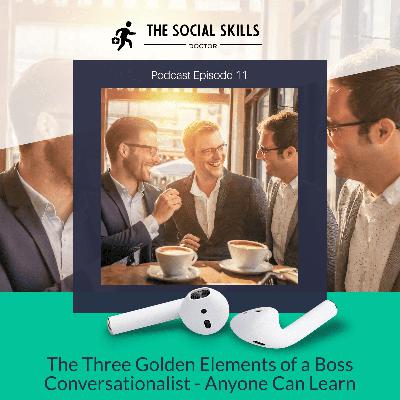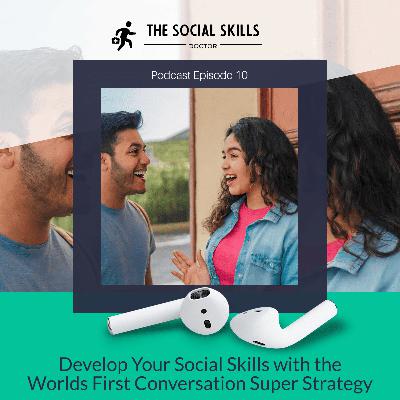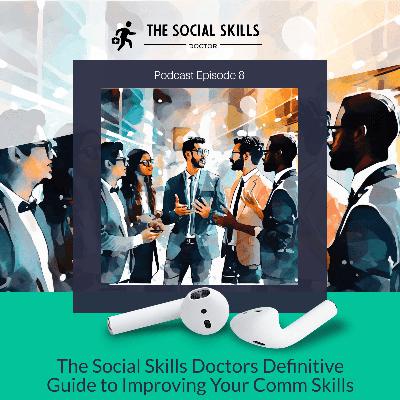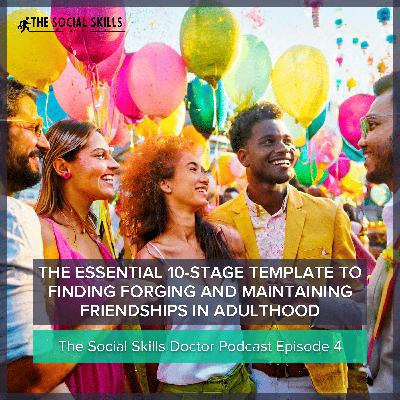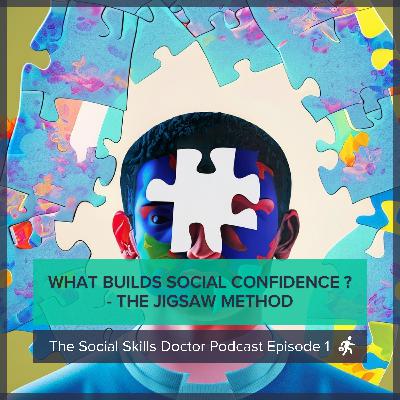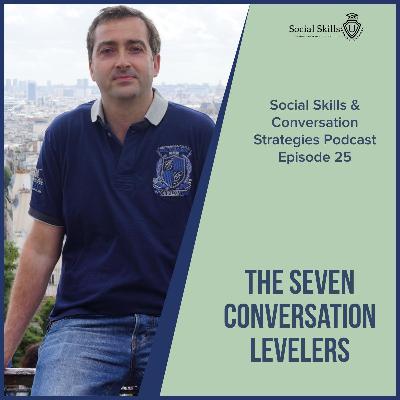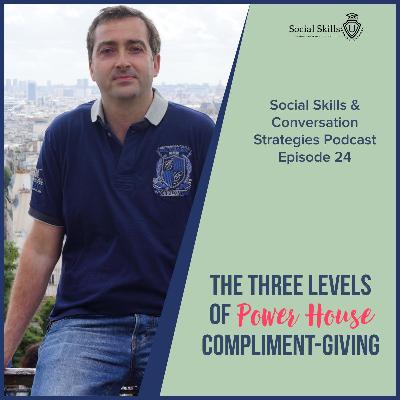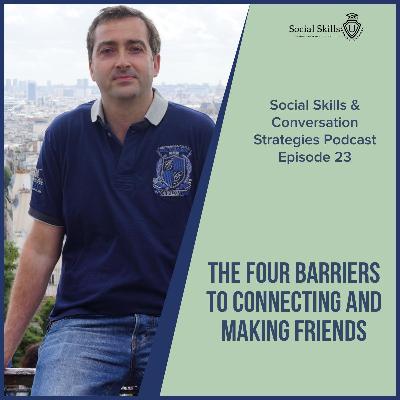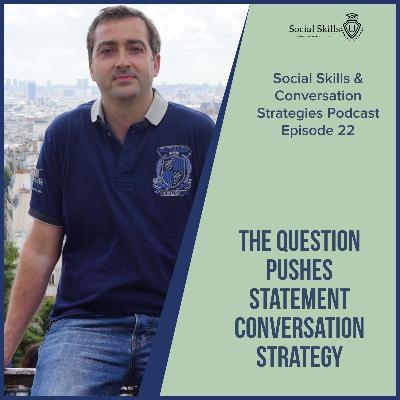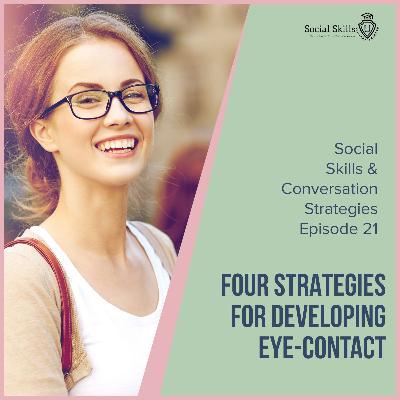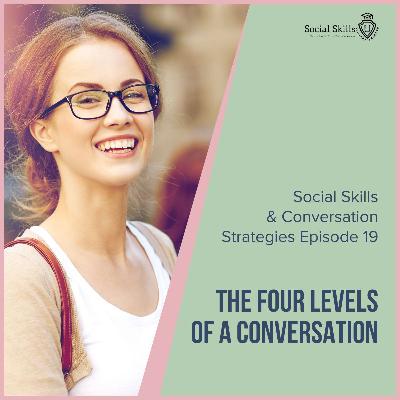Eliminate These Five Social Blind Spots to Improve Your Conversation Game
Update: 2023-11-27
Description
When every conversation feels like a car crash, sometimes the best way to move forward is to go back and identify your blind spots.
Communication skills are not just a nice-to-have, they are a game-changer that can propel you towards success in every aspect of your life. In personal relationships, conversational mastery is the key to winning the human race.
In a professional setting conversation skills are non-negotiable for career growth. Whether you're networking at industry events or navigating workplace dynamics with colleagues and managers. Adept conversational abilities will get you noticed as an influential communicator and enable you to confidently articulate your ideas during meetings or presentations.
So if you're ready to elevate your quality of life, enrich your relationships, and advance professionally, lets park everything I've just said and dive straight in with finding your conversation blind spots.
What makes a poor conversationalist
<figure data-trix-attachment="{"contentType":"image","height":1200,"url":"https://content.app-sources.com/s/40104809416016855/uploads/the_social_skills_doctor/11.1_TOFU_improve_your_conversation-8707884.jpg","width":1543}" data-trix-content-type="image" class="attachment attachment--preview"> <figcaption class="attachment__caption"></figcaption></figure>
<figcaption class="attachment__caption"></figcaption></figure>
 <figcaption class="attachment__caption"></figcaption></figure>
<figcaption class="attachment__caption"></figcaption></figure>Here's a scenario: Somebody is sharing a piece of information, gossip, experience, or story with you, but you don’t have any particular interest in what they are saying, or they missed out an important part of the story and now you can't follow along, much less relate to it. You would like at the very least to ask a clarifying question, but they are on a roll and not stopping for breath.
I have just described my experiences of an older work colleague, the type of person who would frequently launch into rambling stories without giving any context first. A bit like reading a book without the benefit of a synopsis.
My colleague was hitting two blind social spots in one. First he didn't realize that his story-telling style was confusing, and second, he wasn't present enough to realize when his audience had lost focus and interest.
Becoming aware of your social blind spots by raising them into your conscious awareness will give you a quick win without having to do a thing except remedy some bad habits. We will now cover five of the biggest conversation blind spots and see how they can be turned into shining points of light for our personality.
Five blind spots of a poor conversationalist
<figure data-trix-attachment="{"contentType":"image","height":1200,"url":"https://content.app-sources.com/s/40104809416016855/uploads/the_social_skills_doctor/11.2_TOFU_improve_your_conversation-8708797.jpg","width":1543}" data-trix-content-type="image" class="attachment attachment--preview"> <figcaption class="attachment__caption"></figcaption></figure>
<figcaption class="attachment__caption"></figcaption></figure>
 <figcaption class="attachment__caption"></figcaption></figure>
<figcaption class="attachment__caption"></figcaption></figure>1. The superficial one...
Conversations have different levels starting at the surface, where you can talk about anything in your shared environment to get the conversation going. You will then typically move from this superficial level to the information sharing level, and after a while you may go deeper to the opinions and the feelings level.
If the other person is revealing information about themselves but you are staying at the surface level and being guarded about sharing anything back then the conversation is unbalanced.
The blind spot. When someone comments about the weather or something trivial in the environment, the blind spot is not that you, or they, are making boring conversation, the blind spot is turning that ice-breaker into the main subject. Not communicating at the same level will result in no rapport, no connection, and probably no second meeting.
2. The quiet one...
<figure data-trix-attachment="{"contentType":"image","height":1200,"url":"https://content.app-sources.com/s/40104809416016855/uploads/the_social_skills_doctor/11.2d_TOFU_improve_your_conversation-8710462.jpg","width":1543}" data-trix-content-type="image" class="attachment attachment--preview"> <figcaption class="attachment__caption"></figcaption></figure>
<figcaption class="attachment__caption"></figcaption></figure>
 <figcaption class="attachment__caption"></figcaption></figure>
<figcaption class="attachment__caption"></figcaption></figure>When someone is talking you may feel like you need to make a witty or interesting reply, or respond with a thought-provoking question. If you don't or can't they will think less of you. This type of thinking often stems from shyness. In fact, to assume they will judge you negatively means YOU are the one judging THEM negatively.
The blind spot is thinking that there is safety in silence and nobody will judge you as stupid or boring if you don't give them anything to judge you on. The irony of course, is that your silence is more boring than a boring reply.
3. The self-involved one...
<figure data-trix-attachment="{"contentType":"image","height":1200,"url":"https://content.app-sources.com/s/40104809416016855/uploads/the_social_skills_doctor/11.2c_TOFU_improve_your_conversation-8709923.jpg","width":1543}" data-trix-content-type="image" class="attachment attachment--preview"> <figcaption class="attachment__caption"></figcaption></figure>
<figcaption class="attachment__caption"></figcaption></figure>
 <figcaption class="attachment__caption"></figcaption></figure>
<figcaption class="attachment__caption"></figcaption></figure>The self-involved person like my former work colleague, brings a very contrasting experience to the conversational table than the quiet person, but usually no less boring.
Most of us have that one hot button interest or soap box cause that can set us off. Others just seem to have a million stories or opinions just waiting to burst out of them. And it’s a wonderful thing to have such a fertile mind with lots of material. Unfortunately, that material can be a bit like a theme park for the self involved person to get lost in.
Because their stories and opinions are so entertaining and important (at least to them), they think it must also be for you too. And as a bonus, they think they are an excellent conversationalist because they can talk so much.
The blind spot. Not being able to tell a story without rambling, repetition, or an initial hook of interest. And not being socially intelligent enough to be aware when you have lost the attention of your listener.
4. The not listening one...
<figure data-trix-attachment="{"contentType":"image","height":1200,"url":"https://content.app-sources.com/s/40104809416016855/uploads/the_social_skills_doctor/11.2a_TOFU_improve_your_conversation-8709102.jpg","width":1543}" data-trix-content-type="image" class="attachment attachment--preview"> <figcaption class="attachment__caption"></figcaption></figure>
<figcaption class="attachment__caption"></figcaption></figure>
 <figcaption class="attachment__caption"></figcaption></figure>
<figcaption class="attachment__caption"></figcaption></figure>There is little worse than talking to someone and being able to sense that they are not listening. Either their attention is elseware, they are waiting their turn to speak, or they are not interested in what you are saying and don't have the social intelligence to conceal it.
Distracted people give themselves away very easily with their scattered attention, which is either bouncing around the room looking at other people, as though they need to be rescued, or they are checking out their phone. The not listening person will even respond too, or start a conversation with, someone else - while you are in mid-sentence!
While it has become the norm in a society with shorter attention spans, talking over the other person is also a sure sign someone is distracted by something they want to say and has prioritized it over letting you finish what you had to say.
The blind spot here is an absence of active listening skills and not having the presence to realize the lack of respect and poor interpersonal skills this is demonstrating to the other person. If you recognize yourself here, what you are doing is teaching the other person how to treat you in return.
5. The negative energy one...
<figure data-trix-attachment="{"contentType":"image","height":1200,"url":"https://content.app-sources.com/s/40104809416016855/uploads/the_social_skills_doctor/11.2b_TOFU_improve_your_conversation-8709500.jpg","width":1543}" data-trix-content-type="image" class="attachment attachment--preview"> <figcaption class="attachment__caption"></figcaption></figure>
<figcaption class="attachment__caption"></figcaption></figure>
<d <figcaption class="attachment__caption"></figcaption></figure>
<figcaption class="attachment__caption"></figcaption></figure>Comments
In Channel



